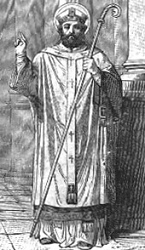
Saint Titus, Bishop
|

Saint Titus, Bishop![]() February 6th
February 6th ![]()
St. Titus was born a Gentile, and seems to have been converted by St. Paul, who calls him his son in Christ. His virtue and merit gained him the affection of the apostle, for we find him emploted as his secretary; and Paul styles him his brother and partner in his labours, commends his zeal for his brethren, and expresses the comfort he found in him, in so much that on one occasion he declared that he found no rest in his spirit because at Troas he had not met Titus. They went together to the council held at Jerusalem to debate the question of the Mosaic rites; and though the apostle had consented to the circumcision of Timothy in order to render his ministry acceptable among the Jews, he would not allow the same in Titus, lest he should thereby seem to sanction the error of certain brethren, who contended that the ceremonial provisions of the Mosaic law were not abolished by the law of grace. St. Paul sent Titus from Ephesus to Corinth to remedy several occasions of scandal, as also to allay the dissensions in that church. He was there received with great respect, and was satisfied with regard to the penance and submission of the offenders; but he could not be prevailed upon to accept from them any present, not even so much as his own maintenance. His love for that church was considerable, and at their request he interceded with St. Paul for the pardon of the incestuous man. He was sent by the apostle a second time to Corinth, to collect the alms for the poor Christians at Jerusalem. All these particulars we learn from St. Paul's two letters to the Corinthians.

St. Paul made some stay in the island of Crete to preach the faith of Jesus Christ; but the necessities of other churches requiring his presence elsewhere, he ordained Titus bishop for that island, and left him to finish the work he had begun. "We may judge", says St. Chrysostom, "from the importance of the charge, how great the esteem of St. Paul was for his disciple." But at his return into Europe later the apostle ordered Titus to meet him at Nicopolis in Epirus, and to set out as soon as either Tychicus or Artemas, whom he had sent to supply his place, should arrive in Crete. St. Paul sent these instructions to Titus in the canonical epistle addressed to him. He ordered him to establish presbyters in all the cities of the island, sums up the principal qualities necessary for a bishop, and gives him advice touching his own conduct to his flock, exhorting him to maintain strict discipline among the Cretans, of whom Paul had a poor opinion. This letter contains the rule of episcopal life, and we may regard it as faithfully copied in the life of this disciple. After a visit to Dalmatia Titus again returned to Crete, and all that can be affirmedfurther of him is that he finished a laborious and holy life by a peaceful death there at an advanced old age. St. Titus has always been looked upon in Crete as the first archbishop of the see, but no special feast was at first kept in his honour in the Western church; it was only in the time of Pope Pius IX that a feast was assigned to him on February 6.
We know practically nothing of St. Titus apart from his connection with St. Paul. Such details as the statement found in the Acts of St. Thecla that Titus was born at Iconium, or that of St. Chrysostom that he was born at Corinth, are quite untrustworthy. For a chronology and a fuller discussion of his character the reader must consult the books especially devoted to St. Paul, such as those of Prat, Le Camus or Fouard. See also Vigouroux, Dictionnaire de la Bible, vol. v, c. 2247. Certain "Acts of Titus", purporting to be written by "Zenas the lawyer", mention in the Epistle to Titus (iii, 13), can only be regarded as a work of fiction; still they seem to have a certain vogue, and the account of Titus which is given in Synaxary of Constantinople under August 25, the date of his feast in the Byzantine church (see Delehaye's edition in the Acta Sanctorum, p. 921), is avowedly derived from this source. Here Titus is represented as of royal descent and born in Crete, whence, at the age of twenty, he was called away to Judea by a voice from Heaven a year before the ascension of our Lord. He is also stated to have lived on in Crete until he was a nonagenarian. See R. Lipsius, Die apokr. Apostelgesch., vol. ii, 2, pp. 401-406.
Butler's Lives of The Saints, Herbert J. Thurston, S.J. and Donald Attwater
Nihil Obstat: PATRICIVS MORRIS, S.T.D., L.S.S., CENSOR DEPVTATVS.
Imprimatur: E. MORROGH BERNARD, VICARIVS GENERALIS
WESTMONASTERII: DIE XXIII FEBRVARII MCMLIII
|
|